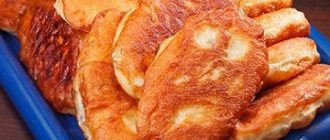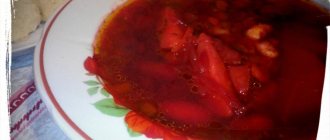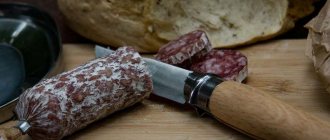Properties of processed cheese
Nutritional value and composition | Vitamins | Minerals
How much does processed cheese cost (average price per 1 kg)?
Moscow and Moscow region.
190 rub.
Agree, for many of us it has become almost a tradition to have breakfast with a cup of aromatic hot coffee with a slice of crispy toast, spread with soft melted cheese. And this is not surprising, because the delicate taste of this cheese makes it one of the most popular products today.
The technology for producing processed cheese is somewhat different from the methods for producing other types of this dairy product. If hard cheeses, for example, are made from milk, then in order to get processed cheese you need to mix several required components. Rennet cheeses, butter, cottage cheese, special cheeses for melting, milk powder and all kinds of fillers and spices make up the main set of products for making this delicate delicacy. They are thoroughly mixed in the required proportions and melted at a certain temperature, resulting in a homogeneous cheese mass called processed cheese.
Today there are an incredible number of varieties and varieties of processed cheese on sale, but it is generally customary to distinguish between 4 types of this delicious product: sausage, slice, paste and sweet. Everything is clear with the first one - its shape resembles a sausage and you can often find black pepper or cumin in its composition. Sliced processed cheese is characterized by a special cheese flavor and retains its shape well when sliced. The pasty version of this cheese can be found mainly packaged in trays and with a necessarily high fat content. Well, sweet processed cheese is a favorite treat for those with a sweet tooth: it often contains honey, cocoa, coffee, nuts, syrups and dried fruits. The calorie content of processed cheese depends on each individual type, but the nutritional value of this product is always quite high.
In cooking, processed cheese is widely used in preparing a wide variety of dishes. You can simply eat it as an independent product or spread it on a slice of fresh bread. In addition, delicious hearty soups and main courses are prepared with this soft cheese; it is added to sauces, salads, casseroles, pastas and pizza.
Who should avoid eating cheese?
Processed cheese, whether homemade or purchased, is a very high-calorie product. Therefore, you should not abuse it, especially for those who are struggling with excess weight. Also, those who have problems with digestion and gastrointestinal tract should refrain from eating the product, the reason is that the cheese contains a high content of citric acid. It is not recommended for young children and those suffering from kidney failure to consume cheese. This is because the product contains a lot of melting salts.
Composition of processed cheese
Compared to hard types of cheese, this product has slight advantages. So, due to some differences in the composition of processed cheese, it is able to be completely absorbed by the body. In addition, this cheese contains less cholesterol.
Processed cheese is a very nutritious product that is quite useful for humans due to the presence of large amounts of calcium and phosphorus, and these elements are responsible for the health and beauty of skin, hair and nails. Another useful substance in processed cheese is casein, a protein of the highest quality.
How to make cheese at home?
To get a 100% natural product, you can make this cheese at home. To begin with, stock up on a liter of milk, prepare two eggs, a kilogram of cottage cheese, butter (100 g), a teaspoon of soda and a tablespoon of salt. Let's start cooking:
- Pour a liter of milk into a deep saucepan and bring to the point where it begins to bubble slightly. It is important not to bring it to a full boil.
- Add all the curd to the milk and, stirring continuously, wait until it curdles. This usually happens after three to five minutes.
- Prepare double gauze and place the cottage cheese on it. While we continue the cooking process, you can hang the gauze so that all unnecessary liquid is drained.
- Now melt the butter in a frying pan and add baking soda, salt, eggs and your favorite spices.
- Place the cottage cheese in the pan and simmer for at least 10 minutes. Do not forget to constantly stir our future processed cheese, because it can simply stick to the pan.
- Soon the substance should thicken and become viscous. When it begins to lag behind the walls of the pan, and not stick to them, the homemade processed cheese is ready!
When the product has cooled, you need to put it in the refrigerator for at least 4, and preferably 6 hours.
Recipe with milk and sugar
There are both more and less calorie options for making cheese. More calories are obtained when adding fat milk, cream or sugar to cheese.
Composition of ingredients
Processed cheese, whose calorie content is 275 kcal, can be prepared from:
- 500 g fat cottage cheese;
- 100 g butter;
- 1 egg;
- 60 g milk;
- ½ tsp. soda;
- ½ tsp. Sahara;
- ½ tsp. salt;
- spices to taste.
It's best not to add ham or olives to this recipe.
Step-by-step cooking process
- Cottage cheese must be punched with a blender until smooth, add milk and mix.
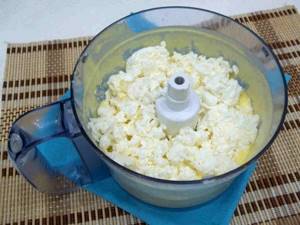
- Next, add the egg and butter and mix again.
- Then you need to add salt, sugar and soda and mix again.
- The resulting mass must be cooked, stirring, in a water bath for 5 - 7 minutes.
- After the mass has become viscous, you need to add spices and cook for another 2 minutes.
This recipe can be used as a base for sweet cheese if you increase the sugar to 1 tsp. and add cocoa or finely chopped candied fruits as spices. The calorie content of such cheese will be more than 300 Kcal, and the carbohydrate content will increase 10 times.
Cheese soup
The lowest calorie dish that can be prepared from processed cheese is soup.
Composition of ingredients
To prepare dietary cheese soup you will need:
- 80 – 100 g sliced cheese;
- a package of frozen vegetables for cooking;
- water;
- salt.
Step-by-step cooking process
- Water should be poured into a saucepan, salted and brought to a boil.
- Then you need to add finely chopped sliced cheese and cook until the cheese is completely dissolved.
- Next, you need to add frozen vegetables, cook for another 7 minutes and remove from heat.
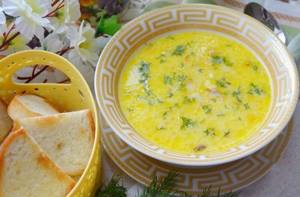
2 ladles of this soup contain about 160 Kcal, but if there are potatoes in the vegetable mixture, the calorie content will increase to 220 Kcal.
Production technology
The traditional preparation technology involves the production of processed cheese by pasteurizing a mixture of cheese products, milk, butter, and additives in the form of melting salts at a temperature of 75 to 95 degrees. This process allows you to preserve valuable and beneficial substances contained in products, as well as destroy harmful microorganisms. After this treatment, the cheese becomes viscous and viscous, homogeneous and can be stored for a long time.
A little later, another technology saw the light - UHT, in which the process takes place at a high temperature, about 140 degrees. Thanks to this, the product is completely sterilized and completely devoid of any microorganisms.
These products can only be differentiated by their shelf life. The sterile product can be stored for more than a year, while regular cheese has a shelf life of up to six months.
Culinary compatibility
Processed cheese is almost universal in gastronomic terms and can be combined with many products. Among them:
- other dairy products and other types of cheeses - ricotta, parmesan, hard cheeses, cottage cheese, sour cream, cream, butter, milk, kefir, fermented baked milk;
- meat and poultry - chicken breasts, fillets and legs, rabbit carcasses, chicken liver, sausages, pork breast;
- vegetables and greens - cucumbers, tomatoes, eggplant, spinach, cauliflower and white cabbage, beets, onions, leeks, carrots, potatoes, zucchini, asparagus, garlic, dill, olives, bell peppers;
- fruits and berries – apricots, apples, pumpkin, blueberries, black currants, citrus fruits (lemon, lime, orange, tangerine, pomelo, grapefruit);
- mushrooms – champignons, porcini, oyster mushrooms, honey mushrooms, boletus;
- fish - herring, salmon, salmon, trout, mackerel;
- bakery and baked goods – cannelloni, penne, white loaf, white bread, butter cookies, tartlets, pasta;
- nuts – nutmeg, walnuts;
- chicken eggs;
- porridge and cereals - buckwheat, oatmeal, rice, millet;
- dry white wine; green and black tea, coffee.
An effective diet is not seven days
About taste and color
The experts who conducted the cheese tasting did not encounter any serious problems. No voids or lumps were found, and the smell, color and consistency of the products meet the requirements of GOST. By the way, an unscrupulous manufacturer may use synthetic dyes to give the cheese a pleasant yellowish tint. According to GOST, only natural carotenoids are allowed to obtain yellowness. Tests have shown that there are no synthetic dyes in any of the samples of the examined cheeses.
However, in terms of taste, smell and/or consistency, almost all of the tested samples did not meet the advanced requirements of Roskachestvo (organization standard, STO). Some cheeses had a taste of pasteurization or melted butter - this is most likely due to the high temperature of pasteurization.
Based on materials from rskrf.ru
Cheese rolls
The simplest recipe for processed cheese is a roll. This is a variation of the sandwich, but healthier and more convenient to eat on the go.
Composition of ingredients
To prepare you will need:
- thin yeast-free lavash;
- spreadable processed cheese;
- leaf salad.
Step-by-step cooking process
The recipe is simple:
- You should spread the pita bread with cheese,
- Then you need to distribute the salad over the pita bread and roll it into a roll.
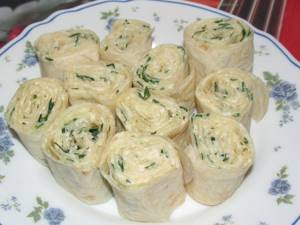
This dish contains about 250 kcal and is rich in protein and fiber. If it's not filling enough, you can add sausage cheese or beef jerky. This will increase the energy value of the dish to 320 - 350 Kcal and increase the protein content.
A little history
Where could such cheese appear? Well, of course, in Switzerland - rightfully considered one of the countries that founded the cheese business. It was invented back in 1911 by Swiss scientists Walter Gerber and Fritz Stettler, who worked in the defense industry. By this time, cheese fondue, which was made by melting hard cheese, was considered a traditional dish for conscripts in Switzerland. It was undoubtedly tasty, but it had one big drawback - the fondue very quickly became unusable. After conducting numerous studies, defense scientists told the world about melting salts. Their discovery made it possible to get rid of the staleness of melted cheese. And today, not a single processed cheese production can do without them.
Content:
- A little history
- Description and types of product
- Chemical composition and beneficial properties of processed cheese
- Production technology
- Use in cooking
- How to choose and store the product correctly
- Diet “Five processed cheese”
- Harmful properties of processed cheese
- conclusions
But processed cheese owes its rise to the masses to the Americans. Cheese merchant James Craft was not delighted with the product, which he nonetheless successfully traded. They say that he once uttered the phrase that it is not bad cheese that causes difficulties for sellers, but any cheese in general, because it is a bad product in principle. It needs to be stored under certain conditions, but it still tends to disappear quite quickly, besides leaving behind a lot of waste. In those days, merchants were required to cut off even a slightly weathered cut of cheese at the request of customers.
It is widely believed that it was Kraft who invented melting salts and was one of the first holders of a patent giving the rights to the production of processed cheese. This happened in 1916. However, some facts suggest the opposite.
The patent held by Kraft was entitled "Process for Sterilizing Cheese and Improving the Product Thus Produced." There was no mention of melting salts at all. Essentially, Kraft was melting down the cheese waste that had been bothering him so much and sealing it in jars, thus creating a kind of fast food prototype. And the melting salts necessary for the production of processed cheese were first mentioned in US patents ten years after they were discovered by the Swiss - in 1921.
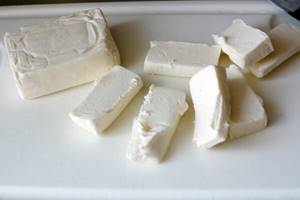
During the First World War, Kraft managed to obtain an order to supply his cheese product to the American military, who were in France at that time. In the same France that has long been famous for its elite and delicious cheeses. And now, instead of the famous French cheeses, Americans were forced to eat canned cheese waste, even melted and sealed in jars. Kraft used the money raised from military supplies for a devastating advertising campaign, the effect of which was impressive: processed cheese overtook live cheeses in popularity. Every second resident of the country was ready to pay even more for them than for durum varieties. By the second half of the 20th century, processed cheese had captured 40% of the market for all cheese products. Of course, this could not but lead to indignation on the part of sellers of natural goods. The advertisement positioned this product as real cheese. They demanded that the new product be called differently, arguing that it was far from genuine. There were many options for names, but in the end we settled on the banal “processed cheese” - processed cheese.
Diet “Five processed cheese”
This cheese is also suitable for weight loss. The diet with its use is balanced, but the portion size is quite small, that is, there will always be a slight feeling of hunger. If you really want to eat, it is recommended to drink water. The course is designed for five days, the result of which will be a weight loss of almost 3 kg. This diet is suitable for quickly getting into shape on the eve of an event.
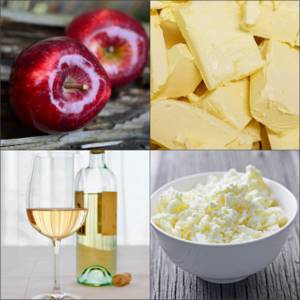
Sample menu for the day:
- breakfast (10.00) – unsweetened black coffee, processed cheese;
- lunch (12.00) – tomato with egg and herbs;
- lunch (14.00) – apple;
- afternoon snack (16.00) – 200 grams of low-fat cottage cheese, cucumber or sweet pepper, greens;
- dinner (20.00) – a glass of dry white wine.
An important condition for such a diet is to eat food exactly two hours apart, and wine is allowed to be consumed four hours after the last meal. This diet should be followed for all five days; the amount of food cannot be changed. During the entire diet, increased drinking is recommended, which should consist mainly of still mineral water.
Before trying the “5 Processed Cheese” diet, you should consult a doctor or nutritionist.
The history of processed cheese
The recipe for processed cheese appeared in 1911. This cheese is considered a fairly modern and popular product. The creator of this dairy product is Walter Garber, a resident of the Swiss city of Thun. The technique was patented in 1916 by James Kraft, owner of Kraft Foods. However, large-scale production was launched only in the 50s of the 20th century. Swiss production technologies were used. In the Soviet Union, the first processed cheese was “Druzhba”. There is a version that processed cheese appeared as a cheaper analogue of brie cheese. For a long time, the elite French variety was not available to everyone, so they began to produce a cheaper and vaguely similar version of the cheese.
Calorie table for cheeses and cottage cheese
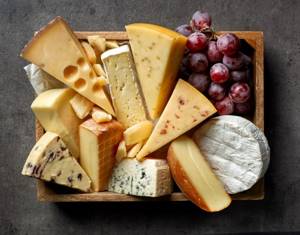
© Mara Zemgaliete — stock.adobe.com
Share:
It is very important that a properly formulated diet is balanced in proteins, fats and carbohydrates. In addition, it is important to consider caloric intake. You need to calculate the KBJU based on your own needs and desires, for example, to gain weight or lose weight. In any case, it is difficult to imagine at least one diet without cottage cheese and cottage cheese. The table of caloric content of cheeses and cottage cheese will help you correctly take into account KBJU.
| Product | Calorie content, kcal | Proteins, g per 100 g | Fats, g per 100 g | Carbohydrates, g per 100 g |
| Curd whey | 20 | 0,8 | 0,2 | 3,5 |
| Almette cheese with porcini mushrooms | 251 | 6 | 23 | 5 |
| Almette cheese with herbs | 216 | 6 | 20 | 3 |
| Almette cheese with yogurt | 183 | 7 | 15 | 5 |
| Almette cheese with cucumbers and herbs | 212 | 5 | 20 | 3 |
| Almette cheese with horseradish | 220 | 6 | 20 | 4 |
| Almette cheese with garlic | 216 | 6 | 20 | 3 |
| Almette cream cheese | 216 | 6 | 20 | 3 |
| Exquisa curd cheese with herbs | 237 | 6,7 | 22 | 3 |
| Exquisa curd cheese with salmon | 235 | 6,7 | 21,5 | 3,5 |
| Fallini Rapesan cheese grated | 478 | 49,5 | 29,2 | 4,4 |
| Cheese Grill Akadia | 245 | 17 | 19 | 3 |
| Cheese Hochland Bleu | 415 | 15 | 39 | 1 |
| Processed cheese Hochland assorted | 303 | 10 | 27 | 5 |
| Processed cheese Hochland Maasdam slices | 270 | 12 | 22 | 7 |
| Hochland processed cheese with ham slices | 288 | 14 | 24 | 4 |
| Hochland processed cheese with cucumbers and dill slices | 269 | 15 | 21 | 5 |
| Hochland processed cheese with salami and spices slices | 284 | 13 | 24 | 4 |
| Processed cheese Hochland Sandwich slices | 279 | 14 | 23 | 4 |
| Processed cheese Hochland Cheeseburger slices | 279 | 14 | 23 | 4 |
| Hochland curd cheese with herbs | 212 | 6 | 20 | 2 |
| Cheese Old Amsterdam | 407 | 6,2 | 39 | 0 |
| President Rondele goat cheese | 354 | 9 | 10,5 | 4 |
| President Rondele curd cheese | 317 | 7 | 31 | 2,5 |
| President Rondele curd cheese with nuts | 315 | 6,5 | 31 | 2,5 |
| President Rondele curd cheese with garlic and herbs | 325 | 6,8 | 31,2 | 4,2 |
| Cheese President Sandwich Master Light | 185 | 16,5 | 8,5 | 9,5 |
| Cheese President Sandwich Master Maazdam | 240 | 13,5 | 17,5 | 6 |
| Cheese President Sandwich Master Mozzarella | 281 | 9 | 20 | 6,5 |
| Cheese President Pichet Mignon | 324 | 18 | 28 | 1 |
| Cheese Abondance | 350 | 26,3 | 26,6 | 0 |
| Adyghe cheese | 240 | 18,5 | 14 | 0 |
| Altai cheese | 356 | 26 | 26,5 | 3,5 |
| Alpine cheese | 353 | 25 | 27 | 0 |
| Cheese Amadeus | 275 | 28,6 | 29,3 | 0,1 |
| Amber cheese | 220 | 31 | 10 | 10 |
| Cheese Anari | 195 | 11 | 15 | 2 |
| Appenzeller cheese | 403 | 24,7 | 31,7 | 2 |
| Cheese Arla Buko | 200 | 8,5 | 17 | 3 |
| Cheese Arla Buko Balance | 200 | 8,5 | 17 | 3 |
| Cheese Arla Natura Light | 260 | 29 | 16 | 1 |
| Cheese Arla Natura Mozzarella | 303 | 26 | 21,7 | 1 |
| Cheese Arla Natura Creamy | 340 | 25 | 26 | 0 |
| Asiago cheese | 122 | 10,9 | 8,1 | 1,2 |
| Cheese Atlet | 290 | 30 | 19 | 0 |
| Cheese Bavaria Blue | 450 | 13,5 | 43,8 | 0,5 |
| Biysky cheese | 371 | 24,2 | 29,9 | 0 |
| Cheese Bongrain Fall Epi | 267 | 28,8 | 16 | 1,8 |
| Cheese Bonfesto Mozzarella Pizza | 256 | 18,4 | 20,3 | 0 |
| Cheese Bonfesto Ricotta Light soft | 145 | 11,3 | 10 | 2,5 |
| Beaufort cheese | 350 | 26,3 | 26,6 | 0 |
| Brie cheese | 291 | 21 | 23 | 0 |
| Brynza cheese (made from cow's milk) | 260 | 17,9 | 20,1 | 0 |
| Brynza cheese (made from sheep's milk) | 298 | 14,6 | 25,5 | 0 |
| Cheese Brynza Serbskaya | 208 | 11,9 | 15,5 | 2,6 |
| Cheese Burata | 330 | 0 | 35 | 0 |
| Cheese Vyrussky | 258 | 29 | 15 | 0 |
| Gouda cheese | 356 | 25 | 27 | 2 |
| Cheese Hermelin | 303 | 20 | 25 | 1 |
| Dutch cheese | 352 | 26 | 26,8 | 0 |
| Gorgonzola cheese | 330 | 19 | 26 | 0 |
| Cheese Mountain | 400 | 29,3 | 29,7 | 1 |
| Grana Padano cheese | 384 | 33 | 28 | 0 |
| Cheese Gracia 20% | 209 | 30 | 9 | 0 |
| Gruyère cheese | 396 | 27 | 31 | 0 |
| Danbo cheese | 340 | 25 | 26 | 1 |
| Danish cheese | 330 | 25 | 24,3 | 0 |
| Cheese Village | 103 | 10,3 | 5,3 | 3 |
| Cheese Dzhugas | 364 | 33 | 25 | 1,7 |
| Homemade Cheese | 113 | 12,7 | 5 | 4 |
| Cheese Dor Blue | 354 | 21 | 30 | 0 |
| Dor Blue cheese a la creme | 265 | 7 | 25 | 3 |
| Cheese Dorogobuzhsky | 332 | 20 | 28 | 0 |
| Green cheese | 356 | 26 | 26,5 | 3,5 |
| Camembert cheese | 291 | 21 | 23 | 0 |
| Cambozola cheese | 427 | 13,5 | 43,8 | 0,5 |
| Cheese Cantali | 234 | 26,7 | 14,1 | 0 |
| Cheese Karat Violette creamy curd cheese | 298 | 8,9 | 27,8 | 3 |
| Processed cheese Karat Volna | 276 | 15,1 | 23,1 | 1,9 |
| Cheese Karat Druzhba processed | 287 | 15 | 24,2 | 2,5 |
| Processed fermented milk cheese Karat | 233 | 14,1 | 18 | 3,7 |
| Processed cheese Karat Orbit | 171 | 24,7 | 8 | 0 |
| Processed cheese Karat with mushrooms for soup | 304 | 15,9 | 25,9 | 1,9 |
| Cheese Karat with onions for soup processed | 323 | 16,4 | 28,6 | 0 |
| Cheese Karat chocolate processed | 311 | 11,6 | 18,5 | 25,8 |
| Cheese Karat Yantar processed | 297 | 12 | 26,4 | 3,1 |
| Cheese Castello Brie | 296 | 19 | 24 | 1 |
| Cheese Castello Danablu | 339 | 19,7 | 28,6 | 0,7 |
| Fermented milk cheese | 133 | 31 | 0,7 | 0,3 |
| Goat cheese | 290 | 21,3 | 21,7 | 0,7 |
| Smoked sausage cheese | 271 | 23 | 19 | 0 |
| Cheese Comte | 407 | 28,4 | 32 | 0 |
| Smoked Cheese | 380 | 27,7 | 25,3 | 7,3 |
| Kostromskaya cheese | 345 | 25,2 | 26,3 | 0 |
| Cheese Kurt | 260 | 25 | 16 | 2,7 |
| Lambert cheese | 377 | 23,7 | 30,5 | 0 |
| Lambert cream cheese | 395 | 23,7 | 32,5 | 0 |
| Cheese Lambert Tilsiter | 339 | 24 | 25 | 0 |
| Cheese Latvian | 316 | 23,3 | 24,1 | 0 |
| Cheese Livaro | 340 | 20 | 29 | 0 |
| Cheese Limburger | 327 | 20,1 | 27,3 | 0,1 |
| Cheese Lithuanian | 250 | 27,9 | 14,7 | 0 |
| Cheese Maasdam | 350 | 23,5 | 26 | 0 |
| Manchego cheese | 395 | 24 | 32 | 2,6 |
| Mascarpone cheese | 412 | 4,8 | 41,5 | 4,8 |
| Mexican cheese | 282 | 24,7 | 19,4 | 3,4 |
| Cheese Mondzeer | 280 | 22 | 20,3 | 6,7 |
| Moscow cheese | 356 | 26 | 26,5 | 3,5 |
| Mozzarella cheese | 240 | 18 | 24 | 0 |
| Cheese Mozzarella Galbani | 196 | 17,5 | 13,5 | 1 |
| Cheese Mozzarella Paladin | 255 | 19 | 20 | 0 |
| Cheese Marble | 326 | 24,8 | 25,2 | 0 |
| Munster cheese | 274 | 24,7 | 17,6 | 3,5 |
| Cheese Nocerino | 332 | 20 | 28 | 0 |
| Ossetian cheese | 356 | 26 | 26,5 | 3,5 |
| Cheese Paneer | 274 | 12,8 | 15,7 | 21 |
| Parmesan cheese | 392 | 33 | 28 | 0 |
| Pecorino cheese | 419 | 25,5 | 33 | 0 |
| Smoked Perlini cheese | 233 | 17,7 | 18 | 0 |
| Cheese Pesto green | 380 | 23 | 32 | 0 |
| Processed cheese | 257 | 16,8 | 11,2 | 23,8 |
| Processed chocolate cheese | 311 | 11,6 | 18,5 | 25,8 |
| Cheese Polessky | 221 | 23 | 14,3 | 0 |
| Cheese Poshekhonsky | 350 | 26 | 26,5 | 0 |
| Cheese Pribaltiyskiy | 332 | 24,6 | 25,2 | 0 |
| Cheese Raclette | 357 | 22,7 | 28 | 1 |
| Cheese Reblochon | 327 | 19,7 | 25,6 | 2,3 |
| Ricotta cheese | 174 | 11 | 13 | 3 |
| Cheese Rocamadour | 290 | 21,3 | 21,7 | 0,7 |
| Cheese Rochischio | 366 | 32 | 25 | 0 |
| Roquefort cheese | 337 | 20 | 28 | 0 |
| Russian cheese | 363 | 24,1 | 29,5 | 0,3 |
| Cheese Rougette | 377 | 35 | 15 | 0,5 |
| Cheese with white mold | 290 | 21,3 | 21,7 | 0 |
| Blue cheese | 363 | 17,6 | 31 | 1,8 |
| Red mold cheese | 340 | 20 | 29 | 0 |
| Blue cheese | 340 | 20 | 29 | 0 |
| Cheese Saler | 350 | 26,3 | 26,6 | 0 |
| Cheese Sbrinz | 429 | 30 | 33 | 0 |
| Sirtaki cheese brine Classic | 225 | 10 | 17 | 8 |
| Cheese Smetankovy | 332 | 21 | 27,5 | 0 |
| Natural goat cheese Snofrisk | 257 | 6 | 25 | 0 |
| Cheese Stepnoy | 350 | 24 | 26,3 | 1,7 |
| Cheese Stilton | 353 | 21,4 | 28,7 | 2,3 |
| Sulguni cheese | 290 | 20 | 24 | 0 |
| Syrobogatov light cheese 25% | 254 | 33 | 13 | 0 |
| Rennet cheese | 305 | 22 | 23,4 | 0 |
| Cheese Curd slice with Provençal herbs | 327 | 12,7 | 30 | 1,4 |
| Cheese Tilsiter | 334 | 27,8 | 25 | 0,1 |
| Cheese Thousand Lakes light 15% | 268 | 31 | 15 | 0 |
| Uglich cheese | 347 | 25,8 | 26,3 | 0 |
| Cheese Favita | 176 | 14 | 12 | 3 |
| Farmer's cheese | 207 | 18,5 | 14,1 | 1,5 |
| Chees Feta | 290 | 17 | 24 | 0 |
| Philadelphia cheese | 253 | 5,4 | 24 | 3,2 |
| Cheese Fontina | 389 | 25,6 | 31,1 | 1,6 |
| Cheese Hollender | 265 | 28 | 17 | 0,1 |
| Cheese Chanakh | 285 | 19,5 | 22 | 0 |
| Cheddar cheese | 392 | 23 | 32 | 0 |
| Cheese Chechil | 313 | 19,5 | 22,8 | 1,9 |
| Chechil cheese brine smoked | 320 | 19,5 | 26 | 2,2 |
| Swiss cheese | 396 | 24,9 | 31,8 | 0 |
| Edam cheese | 330 | 24 | 26 | 0 |
| Smoked Edam cheese | 334 | 24,8 | 25 | 0 |
| Emmental cheese | 380 | 28,8 | 29,7 | 0,1 |
| Cheese Estonian | 356 | 26 | 26,5 | 3,5 |
| Amber processed cheese | 289 | 7 | 27,3 | 4 |
| Jarlsberg cheese | 364 | 28 | 28 | 0 |
| Cheese Jarlsberg Light | 268 | 31 | 16 | 0 |
| Cheese Yaroslavl | 350 | 26,2 | 26,6 | 0 |
| Curd cheesecake | 183 | 18,6 | 3,6 | 18,2 |
| Processed cheese product Hochland Fetaxa | 261 | 8 | 25 | 1 |
| Cheese product Paris Burenka | 232 | 7,2 | 22 | 2 |
| Cheese B.Yu.Alexandrov 5% in dark chocolate | 286 | 13,5 | 12,9 | 29 |
| Cheese B.Yu.Alexandrov in milk chocolate | 410 | 8,4 | 28,2 | 30,7 |
| Cheese B.Yu.Alexandrov in dark chocolate | 419 | 8,6 | 30,8 | 27 |
| B.Yu.Alexandrov cheese with vanilla | 242 | 2,8 | 6,5 | 10,5 |
| Glazed cheese | 407 | 8,5 | 27,8 | 32 |
| Glazed cheese potato | 417 | 7 | 23,4 | 47,6 |
| Glazed cheese with filling | 374 | 9,5 | 21,3 | 36 |
| Cottage cheese 0% (low fat) | 71 | 16,5 | 0 | 1,3 |
| Cottage cheese 0% Losevo | 85 | 18 | 0 | 3,3 |
| Cottage cheese 0.1% | 76 | 16,7 | 0,1 | 2 |
| Cottage cheese 0.2% | 81 | 18 | 0,2 | 1,8 |
| Cottage cheese 0.3% | 90 | 18 | 0,3 | 3,3 |
| Cottage cheese 0.6% (low fat) | 88 | 18 | 0,6 | 1,8 |
| Cottage cheese 1% | 79 | 16,3 | 1 | 1,3 |
| Cottage cheese 1.8% (low fat) | 101 | 18 | 1,8 | 3,3 |
| Cottage cheese 11% | 170 | 16 | 11 | 1 |
| Cottage cheese 18% (fat) | 232 | 14 | 18 | 2,8 |
| Cottage cheese 2% | 103 | 18 | 2 | 3,3 |
| Cottage cheese 4% | 104 | 15,7 | 4 | 1,4 |
| Cottage cheese 5% | 121 | 17,2 | 5 | 1,8 |
| Cottage cheese 8% | 138 | 15 | 8 | 1,5 |
| Cottage cheese 9% (bold) | 159 | 16,7 | 9 | 2 |
| Cottage cheese Arla Keso granular | 70 | 11 | 1,5 | 2,5 |
| Danone cottage cheese 0% soft | 61 | 10,9 | 0,1 | 4 |
| Danone cottage cheese 5% soft | 97 | 8,8 | 5 | 4,2 |
| President Cottage Cheese 9% Crumbled | 153 | 9 | 16 | 2 |
| Cottage cheese Blagoda 12% Peasant | 175 | 14 | 12 | 2 |
| Cottage cheese Blagoda 7.5% low-calorie | 144 | 16 | 7,5 | 3 |
| Cottage cheese Brest-Litovsk 3% Classic | 97 | 16,7 | 3 | 1,4 |
| Homemade cottage cheese (from milk 1%) | 166 | 17,6 | 6,4 | 11,3 |
| Cottage cheese House in the village 0.1% | 55 | 10 | 0,1 | 3,5 |
| Cottage cheese House in the village 9% | 153 | 16 | 9 | 2 |
| Cottage cheese Homemade cheese | 100 | 14 | 4 | 2 |
| Cottage cheese Tender Summer 3% grained | 96 | 15,1 | 3 | 2,2 |
| Cottage cheese Milava 4% soft | 85 | 11,2 | 4 | 1,3 |
| Cottage cheese Milava 9% natural | 147 | 15 | 9 | 1,5 |
| Cottage cheese soft tender low fat | 32 | 7 | 0 | 1 |
| Ostankino cottage cheese low fat | 68 | 13,5 | 0,1 | 3,3 |
| Cottage cheese Piskarevsky 5% | 121 | 16 | 5 | 3 |
| Prostokvashino cottage cheese 0% soft | 63 | 12 | 0,1 | 3,5 |
| Prostokvashino cottage cheese 2% low-fat | 103 | 18 | 2 | 3,3 |
| Cottage cheese Prostokvashino 5% grained | 105 | 12,7 | 5 | 2,4 |
| Prostokvashino cottage cheese 5% grained with strawberries | 127 | 10,3 | 5 | 12,5 |
| Cottage cheese Prostokvashino 5% grained with raspberries | 126 | 10,3 | 4 | 12,2 |
| Cottage cheese Prostokvashino 5% grained with peach | 130 | 10,3 | 4 | 13,1 |
| Cottage cheese Prostokvashino 5% grained with blueberries | 127 | 10,3 | 4 | 13,1 |
| Cottage cheese Prostokvashino 5% classic | 121 | 16 | 5 | 3 |
| Cottage cheese Prostokvashino 9% classic | 157 | 16 | 9 | 3 |
| Cottage cheese Savushkin 0%, low fat | 32 | 7 | 0 | 1 |
| Cottage cheese Savushkin Khutorok 1% | 86 | 18 | 1 | 1,3 |
| Cottage cheese Seryshevsky low fat | 85 | 18 | 1,8 | 3,3 |
| Cottage cheese Tofu | 73 | 8,1 | 4,2 | 0,6 |
| Curd | 341 | 7,1 | 23 | 27,5 |
| Curd mass with raisins | 343 | 6,8 | 21,6 | 29,9 |
| Curd mass with dried apricots | 357 | 9 | 23 | 29 |
| Curd product "Miracle" with vanilla flavor and chocolate sauce | 136 | 4,2 | 5,6 | 17,3 |
| Cottage cheese "Miracle" cherry | 134 | 4,4 | 4 | 20,2 |
| Curd "Miracle" kiwi-banana | 123 | 4,4 | 4,2 | 16,9 |
| Cottage cheese "Miracle" strawberry | 130 | 4,4 | 4,2 | 18,6 |
| Cottage cheese "Miracle" strawberry-strawberry | 131 | 4,4 | 4 | 19,4 |
| Curd "Miracle" peach-pear | 131 | 4,4 | 4,2 | 18,9 |
| Cottage cheese "Miracle" blueberry | 131 | 4,4 | 4,2 | 19 |
| Cottage cheese "Miracle" chocolate | 132 | 4,4 | 4,2 | 19,1 |
You can download the full table so that you can always have it at hand both at home and in the store, here.
Rate the material
Share:




